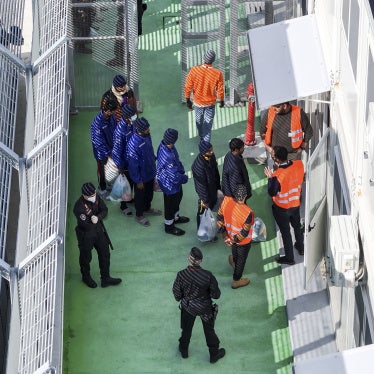I first met Labaan, an 18-year-old Somali boy with a slight figure and a well-styled mohawk, this February, in Malta. Labaan left Somalia when he was 15, shortly after his father was killed. He travelled north by himself, taking months to make his way over land through Sudan and Libya. Eventually, he boarded a rickety boat with about 100 other migrants, and after days at sea, without much water or food, reached Malta.
Malta put him in detention, with adults. For three months.
Boat migration across the Mediterranean is picking up again, now that the summer months make the perilous crossing easier. The conflict in Libya is no longer deterring the sub-Saharan Africans who travel north, fleeing persecution or simply in search of a better life. Among those making the journey are hundreds or thousands of unaccompanied children, like Labaan, who get caught in the web of the European Union's messy migration policies.
Malta's policy is to detain virtually all migrants who travel by boat to the tiny island nation – a gateway to the EU. Because of the EU's Dublin II regulation, which requires asylum-seekers to request asylum in the first EU country they reach, Malta takes on a disproportionate burden. This country of only 400,000 people received 20.1 asylum seekers per 1,000 inhabitants in 2007-11, whereas France, the EU member state receiving the largest number of asylum-seekers in absolute terms in 2011, received about 3 per 1,000. A European Commission pilot project to encourage EU member states to relocate refugees from Malta has had limited impact: in 2010-11, just 228 migrants were relocated from Malta to other EU member states.
Malta does face real migration challenges. But its blanket detention policy is not the answer. Asylum-seekers who arrive by boat are detained for up to 12 months, and migrants who do not apply for asylum, or whose asylum claims are rejected, can be detained for up to 18 months. This detention policy operates in an automated, indiscriminate, and blanket manner in violation of international law.
Detaining children should occur only as a last resort and for the shortest possible period of time. Yet Malta detains unaccompanied children, pending the outcome of a formal age-determination procedure, which Malta claims is needed to establish the fact that they are children, as they arrive without passports or other identifying documents. But our research shows that age determination can take far too long – the children we interviewed were detained for an average of 3.4 months.
Unaccompanied migrant children are extremely vulnerable. Particularly among the unaccompanied migrant children we interviewed, the death of one or both parents, and violence in their home countries, often triggered their decisions to leave. Yet these children are also phenomenally resilient and resourceful. How many 16-year-olds could travel by themselves for months, reaching a new continent? Since reaching Malta and being released from detention, Labaan has put this resourcefulness to good use: he is now enrolled in technical college.
The EU can – and should – help these children far more than it does. The EU should promulgate and enforce stricter standards prohibiting the detention of children. Despite opposition from northern states that benefit from the status quo, the Commission should continue its efforts to reform the Dublin regulation. The EU should also permit greater family re-unification in other parts of the EU for unaccompanied migrant children, many of whom, like Labaan, have relatives in Europe. Labaan and others like him deserve a better chance.
Alice Farmer is a researcher in the children's rights division of Human Rights Watch.







